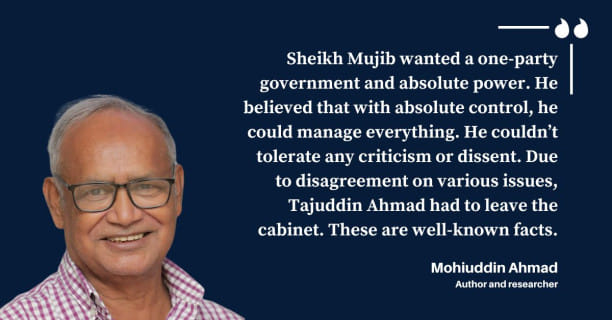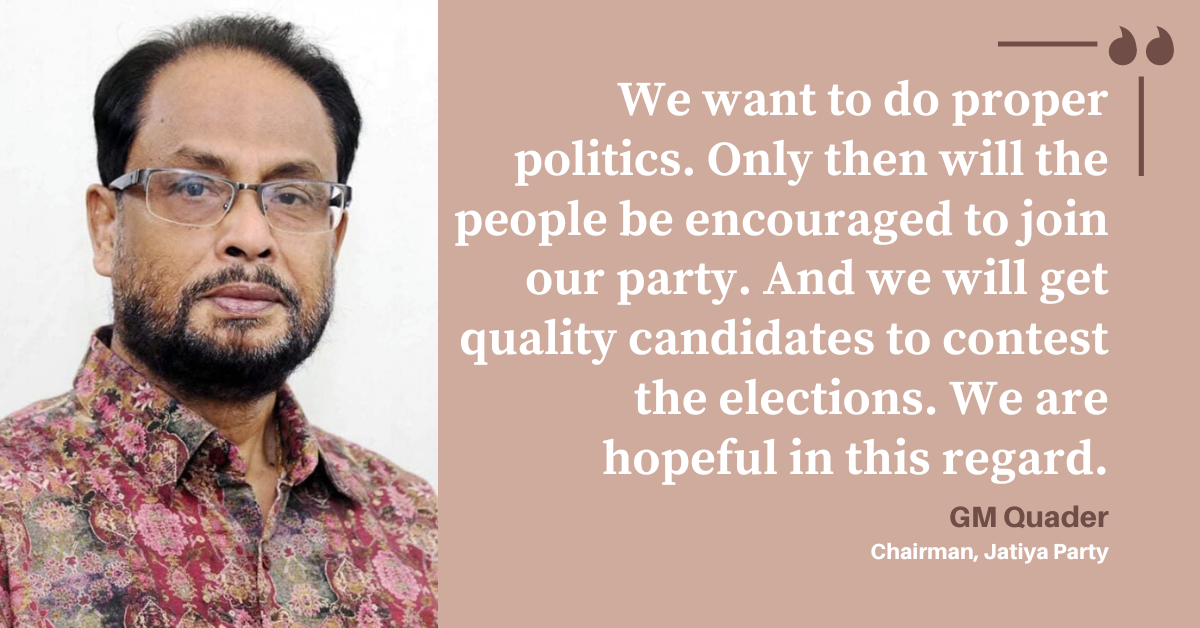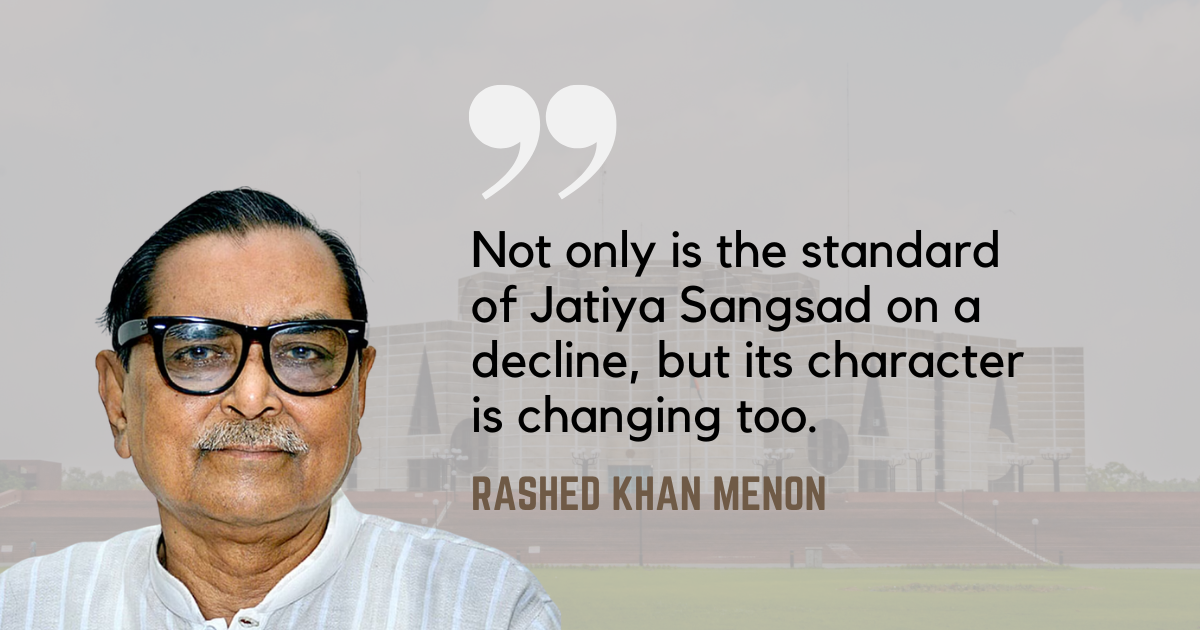‘When a government refuses to go, people accept it until they don’t’

Today marks the 50th anniversary of the Fourth Amendment of the constitution that paved the way for a one-party rule in Bangladesh under Sheikh Mujibur Rahman. Author and researcher Mohiuddin Ahmad talks about the background and formation of BAKSAL in an exclusive interview with Priyam Paul of The Daily Star.
In 1972, there were talks about forming a national government. By 1974, there was a national government called BAKSAL. What are your observations on this?
In 1972, many advocated for a national government comprising all political parties that participated in the Liberation War. However, Sheikh Mujibur Rahman did not agree, and instead aimed to establish a one-party government led by the Awami League. As successive crises hit the country, he struggled to manage them. Handling such crises proved impossible for a one-party government.
In 1975, he could have held a midterm election to seek a new mandate. Instead, he chose to form a one-party government called BAKSAL (Bangladesh Krishak Sramik Awami League). This decision was not made with everyone's consent. Members of parliament at the time were forced to join BAKSAL; they were told that their parliamentary membership would be cancelled if they did not join by April 15. This means it was made mandatory. As a result, two MPs from Jatiya Samajtantrik Dal (JASAD), Moinuddin Manik and Abdullah Sarkar, lost their membership in parliament. Additionally, two Awami League members, Moinul Hossain and MAG Osmany, had already resigned from the party.
Activities of other parties were suspended and all daily newspapers, except four, were shut down. Of the four, two were government-owned: the Dainik Bangla and Bangladesh Observer. The other two were the Daily Ittefaq and Bangladesh Times. The constitution was amended in such a way that it was not exactly a one-party government; it became the government of one person. Everyone depended on him as he held absolute power over the legislative, executive, and judicial branches.
Was the Fourth Amendment to the constitution done to form BAKSAL?
One month after the amendment, Sheikh Mujibur Rahman announced that there would be a party called BAKSAL and he would be its chairman, while the central committee of Awami League would be known as the committee of BAKSAL. In June 1975, he announced the full committee of BAKSAL. Its affiliated organisations were Chhatra League, Sramik League, Krishak League, Mahila League, and Jubo League. Some members from the Communist Party of Bangladesh (CPB) and National Awami Party (NAP) were included in these committees, but there was none from other parties.
Was forming BAKSAL still necessary after the Fourth Amendment?
Sheikh Mujib wanted a one-party government and absolute power. He believed that with absolute control, he could manage everything. He couldn't tolerate any criticism or dissent. Due to disagreement on various issues, Tajuddin Ahmad had to leave the cabinet. These are well-known facts.
Some say BAKSAL was formed on CPB's advice. Is there any basis for this?
Moni Singh opposed it, while Mohammad Farhad supported it. Forming BAKSAL was Sheikh Mujib's sole decision.
After a long career in the democratic movement, why did Sheikh Mujibur Rahman undergo this fundamental change after the Liberation War?
When Sheikh Mujib took sole control of Awami League, he did not allow anyone with differing opinions to remain in the party. He established absolute authority within the party, and since 1964, anyone who opposed him, such as Ataur Rahman Khan and Abul Mansur Ahmad, could not stay. They became his enemies, and the rest were either loyal to him or his subordinates. Therefore, there was never any democracy within the party, and there was no second leader besides Sheikh Mujib either; he was the only leader.
Could you describe the structure of BAKSAL?
BAKSAL had a 15-member executive committee, with Sheikh Mujib as chairman, as well as a secretary general, and three secretaries, including Sheikh Moni. Additionally, there was a 115-member central committee, which included only four members from CPB and NAP.
Did Sheikh Mujib follow any model for BAKSAL?
Sheikh Mujib never mentioned any specific model. It is believed that he came up with this idea on his own. I have detailed this in my book Bela-Obela. He mentioned Senegal and Slovenia, among others. He had the mentality of a morol (village chief), wanting to control everything. Out of the 300 seats in parliament, 293 were held by Awami League, so why was a one-party system necessary? It was because he could not tolerate any criticism, which some newspapers did. He wanted total control. I would say that he was always a dictator, but by forming BAKSAL, he became a fascist.
What was the outcome of BAKSAL?
A one-party rule was established, but Sheikh Mujib did not realise he had lost his popularity. He saw people chanting his name everywhere, but the ground had shifted beneath his feet, and people had turned against him. Constantly surrounded by sycophants, he assumed everyone would agree with him. He left no opportunity for a constitutional change of government. In a parliamentary democracy, elections were supposed to be held every five years. After the 1973 election, the next one was supposed to be held in 1978. However, he declared himself the chairman and president of BAKSAL for the next five years and would decide how many terms he would serve. This meant there was no scope for any change of power through elections. When there is no option to change a government, people either accept it or stage a coup. That is what happened. In August 1975, we witnessed a coup through which the regime changed. Sheikh Mujib had left no other options.
Awami League still believes that BAKSAL was a good initiative. After the 2008 election, Awami League followed a similar path. Although there was a facade of multi-party democracy, in reality, it was a one-person government under Sheikh Hasina's leadership. There are similarities between the two. I would say that this fascist tendency has been ingrained in Awami League's very essence.
Follow The Daily Star Opinion on Facebook for the latest opinions, commentaries and analyses by experts and professionals. To contribute your article or letter to The Daily Star Opinion, see our guidelines for submission.




 For all latest news, follow The Daily Star's Google News channel.
For all latest news, follow The Daily Star's Google News channel. 

Comments